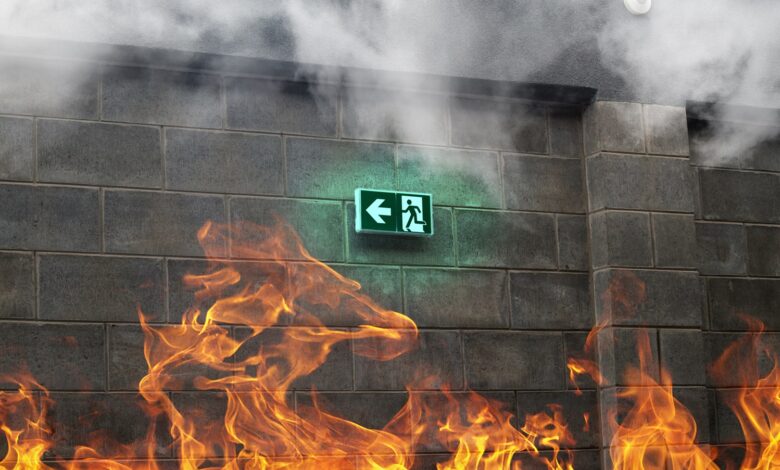
E-scooter apartment inferno reignites safety concerns
Twelve fire crews tackled an intense blaze caused by charging e-scooter: Two residents critical & dozens evacuated from Brisbane apartment building
On Saturday, April 20, twelve fire crews battled an apartment inferno in New Farm, one of Brisbane’s most popular inner-city residential suburbs that left two people in critical condition. Fire investigators say the cause has been traced back to a charging e-scooter.
The incident has added to growing concerns regarding managing the safe charging of lithium-ion batteries, particularly in accommodation buildings both residential and short-stay.
The new print edition of AccomNews is available now. Read it HERE
Updating ABC Brisbane on the New Farm unit fire, a spokesperson from Queensland Fire and Emergency Service (QFES) revealed that a man and a woman sustained severe burns and were placed in induced comas as a result of the blaze. Additionally, a man in his fifties was hospitalised for smoke inhalation. Two others affected by smoke inhalation were treated at the scene and did not require further medical attention.
Initial findings from QFES indicate that the fire was triggered by an explosion from an overheated e-scooter charger and the ferocity of the fire was exacerbated by clutter within the compact unit, leading to what was described as a ‘perfect storm’ of conditions for a fire outbreak.
The massive surge in popularity of devices such as e-bikes and e-scooters presents a significant challenge in strata, for management rights operators and bodies corporate. This is an issue that is of particular concern to industry professionals such as, lawyer, Frank Higginson, Partner at Hynes Legal, who specialises in body corporate law and management rights.
Just last month, Mr Higginson penned a column for AccomNews “Questions flare over e-battery safety”. He warned of the escalating risks associated with faulty chargers for lithium-ion battery-powered devices and stated that the potential for overheating batteries to ignite, poses a serious threat to property and lives.
Importantly, he emphasised the inevitability of such incidents as the prevalence of rechargeable devices continues to rise.
The New Farm unit fire follows a similar incident in a Bondi apartment, where an e-bike battery overheated and exploded, prompting the evacuation of the unit’s occupants, and thankfully on this occasion no one was hurt.
Lithium-ion battery fires are notoriously difficult to extinguish and can emit toxic fumes, posing significant challenges to emergency responders. Mr Higginson asked: “When every e-bike battery is a potential firebomb, what can be done to prevent a possibly tragic event?”
Facilities management consultant, Lynda Kypriadakis, Managing Director of Diverse FMX told AccomNews: “EV batteries are literally a ticking time-bomb. It’s only a matter of time before they degrade sufficiently to be unsafe during recharging, and trigger an overheating or explosion event.
“The risk of a combustion or liquid fuel engine fire is similar to the risk of an EV battery fire, but you don’t store your combustion engine vehicle inside your unit, which is really why the EV battery issue is such a risk to occupant safety in strata properties.”
She warned: “The characteristics of EV battery fires are very different from petrol fires. They are more toxic and much harder to manage from a fire and rescue perspective.”
The QFES has issued guidance on safe charging practices to users, advising individuals to charge e-bikes and e-scooters in well-ventilated areas away from living spaces and direct heat sources. They also stress the importance of using recommended chargers and following manufacturer specifications to minimise the risk of fire.
However, concerns surrounding safe charging extend beyond individual residents and units. Managing the issue is very problematic for those living and working in strata and presents challenges for both bodies corporate and onsite resident managers.
Questions arise regarding the enforcement of charging regulations, liability in the event of a fire, and the integration of EV charging infrastructure in existing buildings.
As the National Construction Code mandates EV charging access for vehicles in newly constructed strata buildings, retrofitting older structures presents logistical challenges. The prospect of centralised charging facilities raises additional safety concerns, highlighting the need for comprehensive risk management strategies.
While technological advancements offer convenience and efficiency, they also introduce new complexities and risks. As stakeholders grapple with these challenges, the imperative remains to prioritise safety and implement proactive measures to mitigate potential hazards.
Mandy has over 17 years of accommodation and tourism industry writing experience and is Editor of AccomNews & Resort News, Publisher of SchoolNews & Director of Multimedia Pty Ltd. She is a retired registered nurse with a 25-year NHS career that followed a few unforgettable years in hotel housekeeping.






